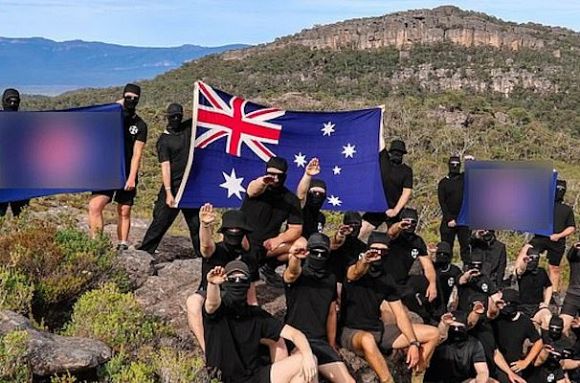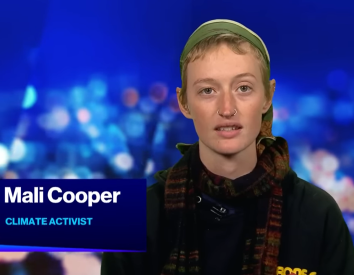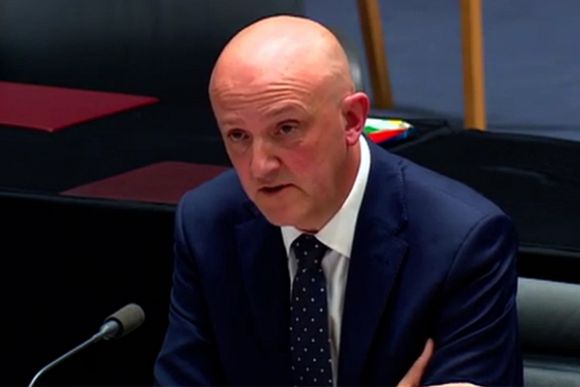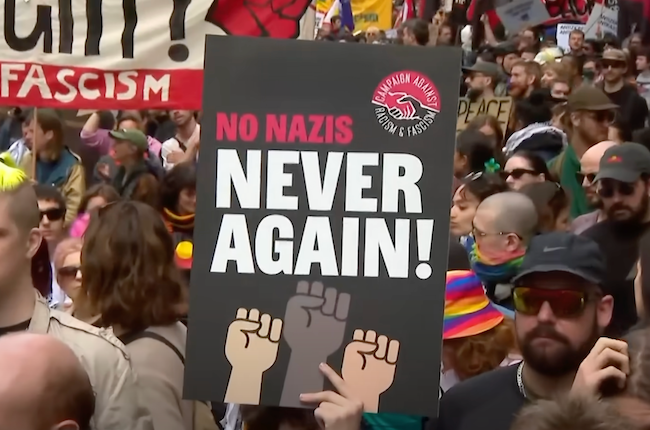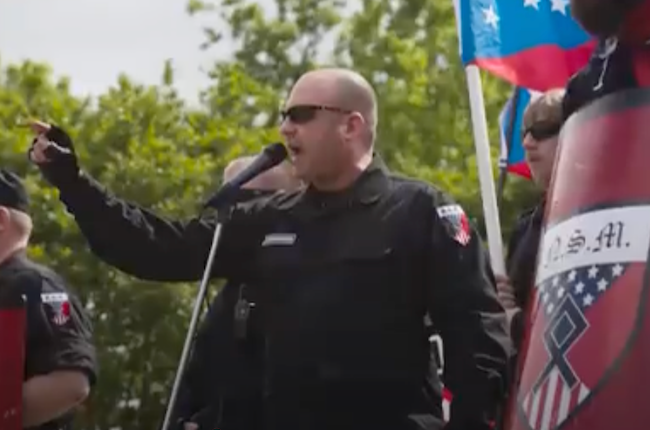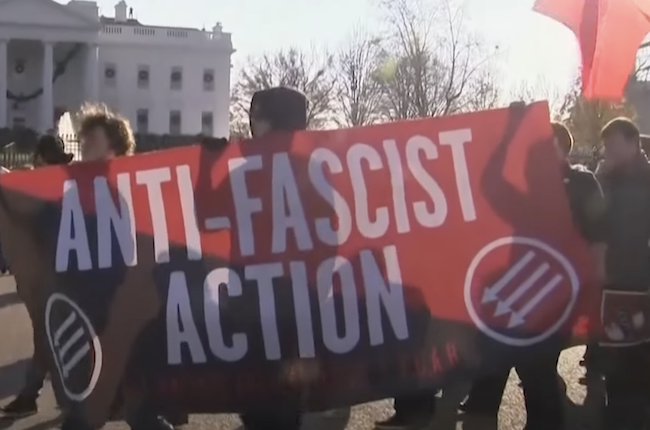Whenever neo-Nazi exploits occur in Australia, politicians and the media cry out for more laws, bans and cops, but their calls are largely misguided, writes Tom Tanuki.
EVERY TIME neo-Nazi stunts happen on the streets – as they did last weekend after the National Socialist Network (NSN) showed up in support of Posie Parker’s trans-exclusionary radical feminist (TERF) rally in Melbourne’s CBD – commentary afterwards turns immediately to legislative reform, police powers and justice.
The key questions we all ask each other:
Should we ban the swastika? Oh, they already banned that.
Should they ban more symbols, then? That ban didn’t extend to swastika tattoos. Should it extend to that too?
How about the sieg heil? Ban that, also? Sure.
Do we need more laws? More cop powers, perhaps? How about the Australian Security Intelligence Organisation (ASIO)? Does it need more neo-Nazi workload percentage points?
These questions form the basis for all topical discussions about neo-Nazis. And every time that happens, I whinge on social media, flapping my arms about how this isn’t an effective response to them. This time I would like to be more productive and articulate where I think these endless calls for more laws, bans and cops come from — and why they are misguided.
I’ve spent many years creating independent media content on fringe political scenes in Australia, alongside organising with anti-fascists and other activist scenes. I enjoy a reasonably-sized platform to make informed commentary on our activist fringe and for that, I’m grateful.
But among the Australian mainstream media and political class, the brand of commentary on the fringe that strikes the strongest note – a white noise I can’t cut through – is the kind that culminates in calls for more laws, bans and cops.
There are non-government organisations (NGOs) and countering violence extremism (CVE) agencies that produce this kind of analysis exclusively. They might produce reports and recommendations on political extremism for government, law enforcement, or state intelligence.
They might be the head of a small – perhaps even one-man – organisation that relies on grants to seek out media spots to make unimaginative commentary on the far-Right, which in turn uses those media spots to justify the receipt of future grants.
As the usual clientele for their analyses are government officials, public service agencies or law enforcement bodies, this shapes the conclusions they draw. They are inclined to recommend the kind of action only their clientele can take — laws, bans and cops.
(Obviously, I have a basic funding source myself – crowdfunding from subscribers by Patreon – so I have my biases too. But I’m free to draw on my experience and suggest that, in response to some fringe political development, people do something, or do nothing, or be nice: in so far as I can word things gently enough to keep my social media, Patreon, or IA column space platforms. But I’m still fundamentally independent. I don’t go about my work assuming I am informing a government or intelligence response.)
Media outlets often seek out these perspectives for comment as they come from visible, public and prominent sources of subject matter expertise. And politicians who make comments on the political fringe have often been briefed by material drawing on these agencies’ findings. It all adds up: the vast majority of what the public hears in moments like these are calls for legislative reform and police powers.
These agencies, NGOs and their recommendations have their place. I don’t mean to undermine their usefulness or merit. They have powers to interact with big tech and government that activists never will.
I suspect social media would be a vastly worse (far-Right) nightmare if it weren’t for their influences. But my concern isn’t with them — it’s chiefly with the state of a national discussion that cannot think of anything better to demand than more laws, bans and cops with respect to… extremism. (Even the word "extremism" comes from these agencies: I must stop writing it!)
We’ve had our imagination cut off by this discourse. The thought of doing anything else about nascent neo-Nazi street formations doesn’t even cross our minds.
My argument is that cops and governments can’t do anything about this problem.
Let’s stop deluding ourselves that Victoria Police (VicPol) would rubber stamp preventing a small group of neo-Nazis from sieg-heiling in public. That would be the work of a body focused on social cohesion.
VicPol is a weaponised paramilitary force which has been overfunded by Daniel Andrews’ Labor Government for years. When a rally happens, its purpose is to guard against property damage, put down excessive displays of political will and demonstrate the strength of the state.
(Remember, last weekend’s rally happened at Parliament House, which has rifle slots all along the top of it that were installed in 1860 to shoot rioting voters. They weren’t put there to shoot anti-social voters. None of this is new.)
The ambient societal problem that fuels neo-Nazism is a climate of fear and scarcity. We all harbour many real-world fears about climate change and the growing economic and living stability disparity between rich and poor. We all feel some degree of alienation from institutions of power, including government and media.
Fascists' aims are to catch the disenchanted with their dated power conspiracies. In that regard, VicPol stormtroopers don’t just fail to solve the societal problem of neo-Nazism; they probably – given their tendency to alienate us rioting peasants – make it worse.
(Also, numerous organised Australian neo-Nazis are the sons and partners of police officers, so why would they fear the police? The police are their family.)
Setting cops aside, then, I'll move on to the government and making more laws.
History demonstrates that expanded legislative and police powers are used against everyone — and particularly against the radical Left or progressives. Most expanded laws to deal with protests are aimed squarely at us anyway.
The NSN have plenty of other gestures they can use and symbols they can deploy. Banning some bad symbols will only lend more power to new ones. The media and the commentary class cannot help but aid in empowering new symbols intentionally deployed by a far-Right minority anyway, as we’ve learned in the past — I have no doubt we’ll gladly hand them as many new symbols as they demand of us.
Furthermore, the NSN might be able to legally contest these new laws and has already said it will try. Months or years of free publicity over legal disputes would only work in the organisation's favour.
Civil liberties organisation Liberty Victoria made a statement on last weekend’s TERF and neo-Nazi rally:
Liberty Victoria does not consider that criminalising far-Right symbols and gestures is an effective way to address far-Right extremism. We must be careful that responses to extremism, however well-intentioned, do not become excuses to expand executive power, state surveillance and censorship.
What is used to justify censorship now may in turn be used to justify further censorship in the future. In our view, extremism like we saw on the weekend requires addressing social and structural issues that are fuelling systemic inequality, injustice, racism, as well as a declining trust in institutions, government and the media.
Added Liberty Victoria:
'What will become a never-ending list of far-Right prohibited icons and gestures is, at best, a band-aid solution which fails to address a much deeper problem in our community.'
People calling for more laws, cops and bans don’t understand how anti-fascism played a pivotal and multi-dimensional role in ruining the patriot movement. Therefore, it can do so again with other smaller neo-Nazi formations.
To know this, you’d have to have taken part or taken an interest. This is fundamentally a question of community resistance: of needing a healthier, organised, activist Left — something Melbourne has plenty of experience with.
This week I released the video (below) on responding to TERFs and neo-Nazis, so I won’t go into my suggestions for a more energised Left response again here. I only want people to understand that more bans, laws and cops will not solve the problem of neo-Nazis on the street.
These suggestions are often well-intentioned, but they come from people who lack the vision and insight to know how it’s possible to band together as a community against dangerous grassroots political movements.
Tom Tanuki is a writer, satirist and anti-fascist activist. Tom does weekly videos on YouTube commenting on the Australian political fringe. You can follow Tom on Twitter @tom_tanuki.
Related Articles
- The community must protect LGBTQ+ events from the far-Right
- Neo-Nazi pub incident more complex than it seems
- Australia's neo-Nazi threat — Revealed: Amongst Us
- From Proud Boy to Nazi in two months
- Neo-Nazis in the Grampians: 'Just white men on a bushwalk'
 This work is licensed under a Creative Commons Attribution-NonCommercial-NoDerivs 3.0 Australia License
This work is licensed under a Creative Commons Attribution-NonCommercial-NoDerivs 3.0 Australia License
Support independent journalism Subscribe to IA.




